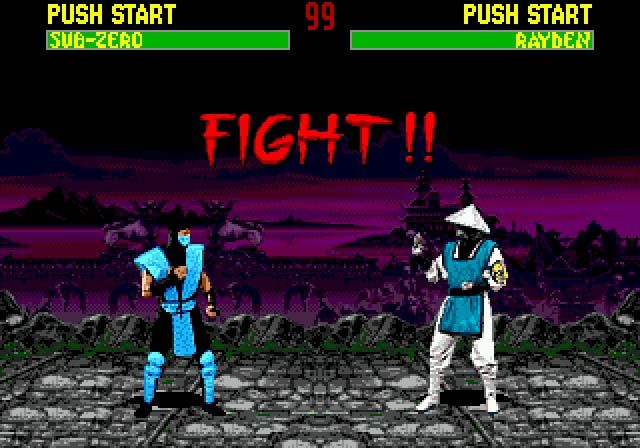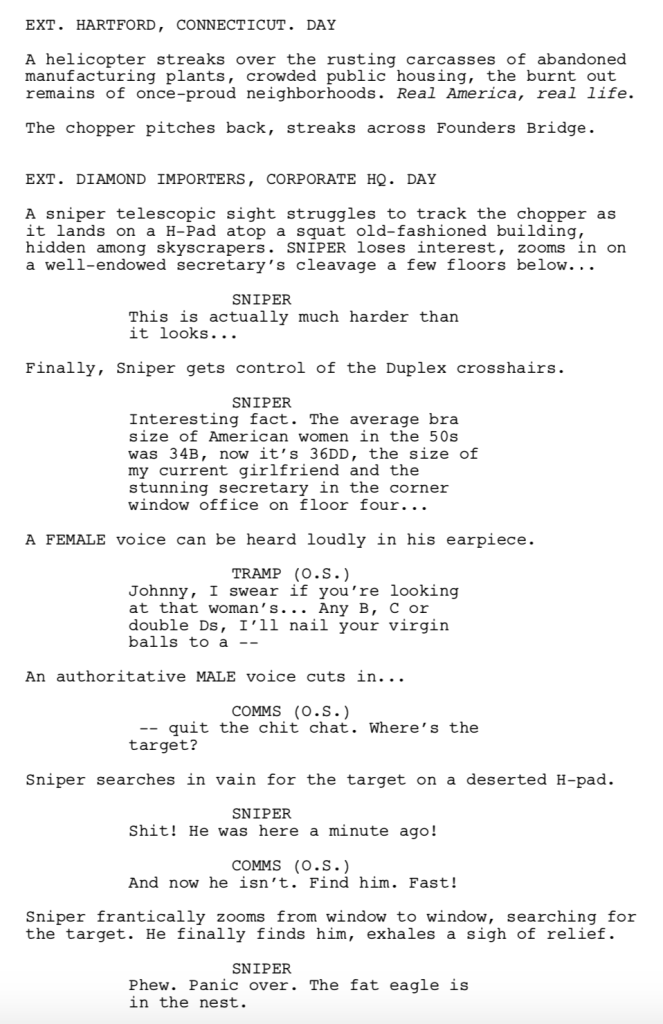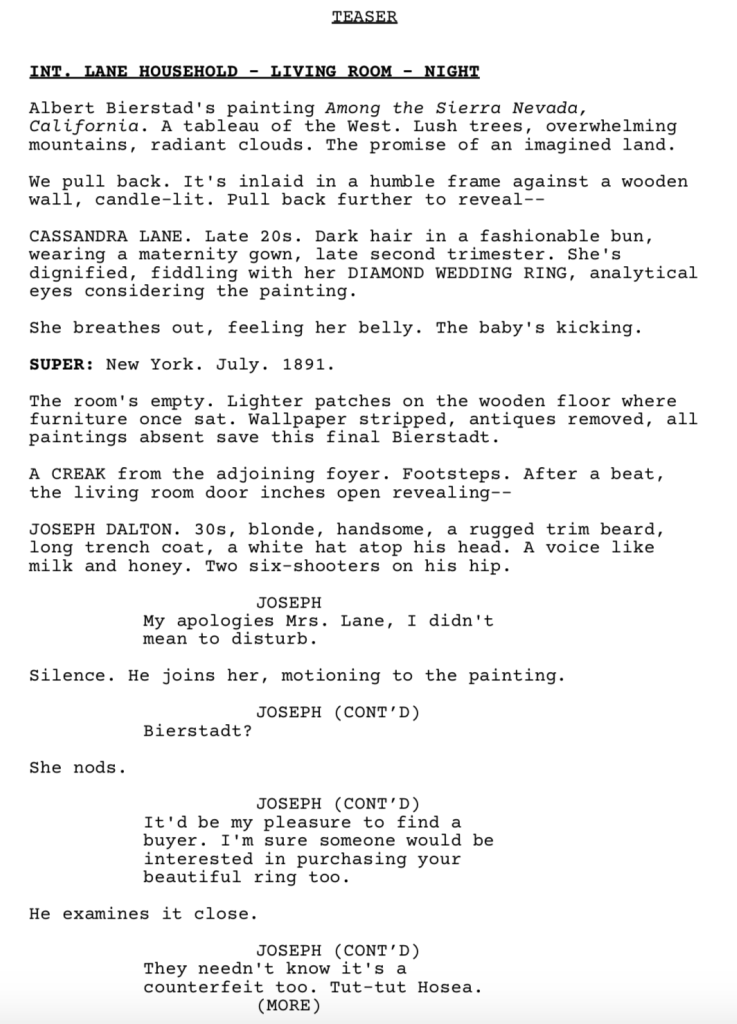Last week’s Amateur Showdown was basically a 3-way tie (14 and 1/2 votes for Money to Burn, 13 votes to Odyssey, and 13 votes to The Black Petrel) with some hints of suspect voting, which means I get to decide which of the three I want to review. I went back and forth between Money to Burn and Odyssey. I know that Jay (Money to Burn author) can write. And I get a sense through some e-mails with Alex (Odyssey) that he knows what he’s doing as well. When it comes down to calls this close, there’s only one solution –
FIRST. PAGE. SHOWDOWN.
[echo] showdown…showdown…showdown
That’s right. Here at Scriptshadow when scripts need to be picked and the picking ain’t easy, the written word is the only solution. So here we go. This is the first page of Money to Burn…
And here’s the first page of Odyssey…
Let’s start with Odyssey. Its opening is fine for a movie or cinematic TV show. I can envision the gentle dolly back of the camera from the painting and into the room. But as a script opening, it’s not very good. Scripts aren’t about camera moves. They’re about grabbing the reader. With that said, the writing is strong and detailed and I feel like the writer has a good grasp of the craft.
Moving over to Money to Burn, we’re in a helicopter, a sniper’s looking for his target. Something’s happening! This is a much better opening – dropping us into the thick of things. But like any good Amateur Showdown, there’s a twist. I look to the top of Money to Burn and see… 123 pages??? For a heist flick? That’s a loonnnng script. And Jay’s been at this for awhile. He should know how much high page counts affect readers.
I’m torn about which one to go with but when reading one script gives me an entire extra hour to my evening (Odyssey is 63 pages), that’s the script I’m going to choose. So I’m going with Odyssey.
Genre: TV Pilot/Western
Premise: A fierce pregnant widow makes a deal with a degenerate grave-robber to help her escort a herd of cattle across the Old West while the psychotic creditor that drove her husband to suicide and murdered her father stalks her across state-to-state, determined to make her pay up, or worse.
Why You Should Read: My bread-and-butter trademark is to take a tried and tested genre and write a new interpretation of old tropes. I think we all love westerns for the grizzled stares, the melodramatic music, and the collective fantasy of a lawless land. I do too. But I’m more interested in what the genre can do in the modern-day, not confined by what your Dad might like to watch on a sleepy Sunday afternoon. Odyssey is a pilot for a mini-series that honors what has already been done in the genre, but also takes it forward into new, exciting directions.
Writer: Alex D. Reid
Details: 62 pages
it’s 1891 and 20-something Cassandra Lane is pregnant. Being pregnant back in the 19th century was no picnic but you know what’s less of a picnic? Joseph Dalton, the mean-mugging creditor who Cassandra’s husband owes 5000 dollars to. Joseph’s shown up to the couple’s home in New York to get his money. There’s only one problem. They don’t have it.
After yelling at Cassandra for awhile, Joseph goes upstair to confront the man in question, Hosea, who, when confronted with the reality that he’s never going to find a way out of this, blows his own brains out. That cowardly move suddenly transfers the 5000 dollar debt on Hosea’s head, and puts it squarely on Cassandra’s. Isn’t that special.
Cassandra manages to flea New York and go back to her home state of Kansas. It’s here where she reunites with her widowed father, Nathaniel, who’s having money problems of his own. He can barely pay rent. Yeah, living back in the 19th century pretty much blew. Between your house burning down every month and contacting polio several times a year, you were constantly getting swept away in the Johnstown Flood.
That big fat meanie, Joseph, along with his gang, follows Cassandra all the way to Kansas and kills her dang dad! It looks like Cassandra’s going to be next. But when the gang members carry Cassandra out to shoot and kill her, she’s saved by a grave-robber named Dante, who, ironically, was planning on grave-robbing her father. But this is far from friendship at first sight. The very next day, Dante steals Cassandra’s father’s cattle, which he plans to take to California and sell.
Back at home, Cassandra is visited by yet another nasty presence, a bounty hunter looking for Dante. When he realizes Dante is long gone, he tortures Cassandra, who uses every last bit of grit and spittle to escape and kill the dude. Afterwards she steps outside to see, guess who? Dante. Who’s had a crisis of conscious. Seems he’d rather herd these cattle to California with their rightful owner. So off they go. But little do they know, the evil Joseph is on their trail.
I had mixed feelings about Odyssey.
I was not a fan of the first scene. It was written like Cassandra and Joseph were alone. Joseph’s creeping up on her. We’re thinking she might be in danger. But then, the guy they’ve been talking about this whole time, her husband, was upstairs. Just kicking it by himself. If he’s here to see that guy, why is he talking to Cassandra? So then we go upstairs and have a secondary scene in the house where Hosea is flinging a gun around, threatening to kill himself, and finally does it. The dialogue here felt very soap-opera-ish. On the nose. Overly dramatic (“I can’t even look after my own goddamn wife and child from–from fucking PARASITES like him! What the hell am I if I can’t do that, huh?” “The man I love.”). It didn’t set the pilot off on the right foot, that’s for sure.
And a funny thing happens when the first scene doesn’t work. It triggers a psychological shift in the reader where they lose a little faith in the writer. They don’t move forward with as much confidence. But hey. I was on the fence with Cop Cam for a while and that script turned around quick. So this was far from a script killer.
What annoyed me, though, was the jumping around in time. I don’t mind storyline jumping that much, but it has to have a clear purpose behind it. And this felt more like we were scrambling up the timelines in an attempt to add some extra flash to fairly plain story. I still don’t understand why we were cutting back to Cassandra, her dad, and some Indian kid. I never cracked the importance of that storyline.
The pilot works best when it’s sitting in its scenes and letting the characters push towards potentially ugly situations. Like when the bounty hunter has Cassandra all alone in her house. It’s one long scene but it properly builds a sense of dread and a fear that Cassandra isn’t going to make it out of here alive.
I also liked Alex’s fearlessness. This isn’t your grandfather’s Western TV show. People die in horrible ways and Alex isn’t afraid to show it. Heck, even Cassandra’s poor dog is offed. And while normally, I’m not a fan of animal deaths, it serves a purpose here, which is to make clear to the audience, nobody is safe in this world. And that’s important in a TV show because we’re more likely to watch if we think people are legitimately in danger. Isn’t that when Walking Dead and Game of Thrones were at their best? When you had no idea who was going to make it out of an episode? Once it was clear every main character was getting out of a season alive, those shows went south.
It’s not easy for me to grade this pilot because there’s plenty of things to celebrate. But between the weird time-jumping and the lack of anything that truly set this Western apart from anything I’ve seen before, I’d have to say this just misses a ‘worth the read.’ But Alex should be proud. There’s plenty of skill on display here.
Script link: Odyssey
[ ] What the hell did I just read?
[x] wasn’t for me
[ ] worth the read
[ ] impressive
[ ] genius
What I learned: I’m always looking to see if I can simplify a story. And something bothers me about the structure here. We move from New York to Kansas…. so we can move from Kansas to California. Why can’t we redistribute the whole story so that we start in Kansas? That way it’s simpler. We start the movie in Kansas and the pilot is used to set up the rest of the show – which is to move to California. And here’s why plot simplicity is important. The way it is now, Alex is forced to create all of this exposition to explain New York and Joseph and her husband and her father. If we could build this dilemma in Kansas, we wouldn’t have to use precious screenplay energy to rehash a bunch of backstory.




